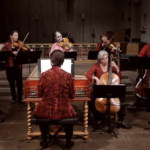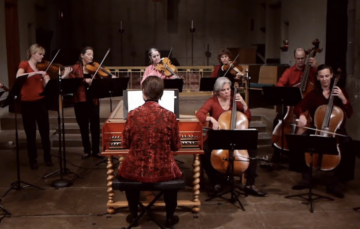

“Subtle and brilliant at the same time, they are a microcosm of Baroque music, with an astonishingly vast sample of that era’s emotional universe.” — Ted Libbey
The portfolio, the demo, the head shot, the resume…. These are not materials made for general consumption, much less the praise and admiration of posterity. But not every applicant is Johann Sebastian Bach, who wrote his six Brandenburg concertos, in essence, “because, like pretty much everyone throughout history, Bach needed a job,” notes String Ovation. In 1721, he applied for a position with the Margrave of Brandenburg, younger brother of King Frederick Wilhelm I of Prussia, by sending the music: “It’s one of the few manuscripts that Bach wrote out himself, rather than give to a copyist…. At the time, Bach was the Kapellmeister in the small town of Cöthen. Working for His Royal Highness would have been a seriously upward move.”
He didn’t get the job. Indeed, it seems his application was ignored, and nearly lost several times throughout history. Now, Bach’s calling cards are some of the most virtuoso compositions of Baroque music we know. “Each concerto is a concerto grosso, a concerto that’s a continuous interplay of small groups of soloists and full orchestra…. The range of instruments with solos throughout the six concertos was designed to give opportunities to show the potential of nearly every instrument in the orchestra. Even the recorder got a solo.” The six together present themselves as an anthology of sorts, “a Baroque musical travelogue moving through ‘the courtly elegance of the French suite, the exuberance of the Italian solo concerto and the gravity of German counterpoint.’”
These pieces do not only demonstrate Bach’s compositional mastery; they also represent his “ultimate view,” as the Netherlands Bach Society points out, “of the most important large-scale instrumental genre of his day: the concerto.” In the third of these works, for example, he makes the “surprising” choice to compose for “three violins, three violas, three cellos and basso continuo. In other words, 3×3, which is a rational choice you would expect from a modernist like Pierre Boulez, rather than a Baroque composer like Bach.” In order to play these pieces the way Bach intended them to be heard, Ted Libbey writes at NPR, they must be played on the original instruments for which he composed, something a growing number of ensembles have been doing.
Voices of Music, one of the most prominent ensembles recovering the original sounds of Bach’s time, performs Concerto Number Three in G Major at the top and Concerto Number Six in B Flat just above, another surprising arrangement for the time. The final Brandenburg Concerto also upsets the musical order of things again: “Violins — usually the golden boys of the orchestra,” writes the Netherlands Bach Society, “are conspicuous by their absence! Instead, two violas play the leading role. As the highest parts, they ‘play first fiddle’ as soloists, supported by two viola da gambas, a cello, double bass and harpsichord.” The Margrave of Brandenburg, it seems had little time or interest, and never had these pieces performed by his ensemble, which may have lacked the skill and instrumentation. After hearing this music in its original glory, we can be grateful Bach’s handwritten resume survived the neglect.
Related Content:
Hear 10 of Bach’s Pieces Played on Original Baroque Instruments
Watch J.S. Bach’s “Air on the G String” Played on the Actual Instruments from His Time
Josh Jones is a writer and musician based in Durham, NC. Follow him at @jdmagness
Hear Bach’s Brandenburg Concertos Played on Original Baroque Instruments is a post from: Open Culture. Follow us on Facebook and Twitter, or get our Daily Email. And don't miss our big collections of Free Online Courses, Free Online Movies, Free eBooks, Free Audio Books, Free Foreign Language Lessons, and MOOCs.
from Open Culture https://ift.tt/2UrjUKb
via Ilumina


Comments
Post a Comment